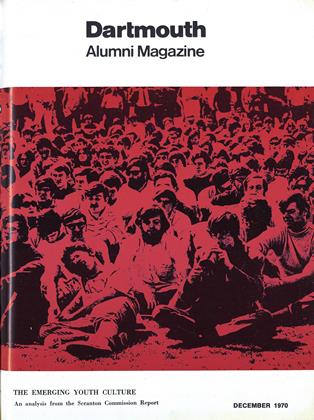By Frank D. Gilroy '50. NewYork: Harcourt Brace Jovanovich, Inc.,1970. With 15 illustrations. 151 pp.$5.95.
Books of war experiences are getting to be a dime a dozen. Every general from the Civil War on has felt a compulsion to give his version of the war in which he fought, and some of these have been helpful later to historians. Very few private soldiers seem to have felt this compulsion, and even if they had, it is dubious that they could persuade a publisher to print the book. Stephen Crane managed the feat and wrote about the Civil War from the soldier's viewpoint, but he disguised that as a novel. Since then, the private soldier's story, if told at all, has usually been reconstructed from letters and odd documents that happen to turn up in later years and are assembled by an editor into coherent footnoted accounts.
It is a striking thing, then, to come across an account of the war years, wholly personal, written by Frank D. Gilroy, who remained in the ranks for the duration of the Second World War. His view of the conflict will probably never be cited in footnotes in histories of World War II, but this story of a lad who found himself in the army at eighteen is one that parallels and deepens everyone's memories and experiences of the years 1942-45. It is the tale of a boy caught in the incredible events of that time who persisted and matured precisely because survival demanded it. We follow him through the draft into the training camps and on to the troop transport for France. The remainder of the book is the story of a boy private in a reconnaissance troop for Patton's army across France and into Germany. Finally the man comes home. There are no battle-plans and high strategy, no mock heroics, just the simple everyday life of a soldier, told in unsentimental bursts, a kind of prose-poem.
The writing, lean and meaty, served up in short paragraphs, even single sentences, gives the effect of the Japanese poetic form of haiku. But these are enough. The start of the troop ship across the Atlantic is summed up with the line: "Is this trip necessary?" and the sea voyage is characterized by: "Bidwell empties my helmet along withHoneyrood's—helps me topside for themandatory airing." As the army approaches the front: "We pass a dead G.I.—the firstwe've seen. It takes a moment to connecthim to the war." And then, "I down all thecandybars (five) as a hedge." After the first blooding: "We've been on a mission—theother platoons haven't. We're worlds apart."
The soldier's world, so circumscribed that the sense of time is lost in routine, is occasionally shattered by history. "Lateafternoon. I drum with twigs against anarmored car. They interrupt the music to sayPresident Roosevelt is dead. I want to feelsad but I can't. I've survived another day." and again: "How could one bomb level acity? What's an atom? It's good news butpuzzling." The war is over: "I look for agreat celebration. Here and there a bunch ofGI's try to get things started but somethingwon't ignite." Finally, the man returns: "Hasit changed you?" "I use my hands instead ofa washcloth." "What else?" "I can't read thefunnies any more."
Private is about a boy's growing up FAST in a most unprivate world.
Professor of English at Dartmouth Collegeand Director of the Experimental Theatre,Mr. Williams directed two plays by Mr.Gilroy when he was an undergraduate: The Middle World and The Great Art.
 View Full Issue
View Full Issue
More From This Issue
-
 Feature
FeatureThe New Youth Culture
December 1970 -
 Feature
FeatureThe Outward Bound Term
December 1970 By Robert B. Graham Jr. '40 -
 Feature
FeatureTrustees Reenact 1770 Board Meeting
December 1970 -
 Article
ArticleBig Green Teams
December 1970 -
 Article
ArticleFaculty
December 1970 By WILLIAM R. MEYER -
 Article
ArticleThe Undergraduate Chair
December 1970 By CHRISTOPHER CROSBY '71
HENRY B. WILLIAMS
-
 Books
BooksSCENERY FOR THE THEATRE
January 1939 By Henry B. Williams -
 Books
BooksTHE STAGE MANAGER'S HANDBOOK.
January 1954 By HENRY B. WILLIAMS -
 Feature
FeatureTHE EXPERIMENTAL THEATRE
June 1954 By HENRY B. WILLIAMS -
 Books
BooksSHAW AND THE 19TH CENTURY THEATRE.
NOVEMBER 1963 By HENRY B. WILLIAMS -
 Books
BooksTHEATRES AND AUDITORIUMS
JUNE 1965 By HENRY B. WILLIAMS -
 Books
BooksTHE TRINIDAD CARNIVAL, MANDATE FOR A NATIONAL THEATRE.
APRIL 1972 By HENRY B. WILLIAMS
Books
-
 Books
BooksALUMNI PUBLICATIONS
January, 1925 -
 Books
BooksFragmentary Future
JAN./FEB. 1979 By ELISE BOULDING -
 Books
BooksTHE WINOOSKI,
June 1949 By Herbert F. West '22 -
 Books
BooksFaculty Books
July 1953 By LOUIS O. FOSTER -
 Books
BooksA HISTORY OF MODERN PHILOSOPHY
April 1941 By Rees H. Bowen -
 Books
BooksICE HOCKEY.
DECEMBER 1958 By TED EMERY

